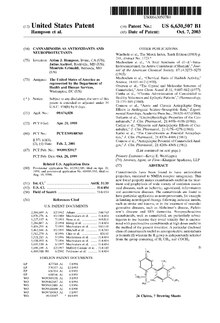KannaLife
 | |
| Company type | Private (Subsidiary) |
|---|---|
| Industry | Pharmaceutical |
| Founded | 2010 |
| Founders | Dean Petkanas, Thoma Kikis |
| Headquarters | Doylestown, Pennsylvania |
| Total assets | Exclusive License of patent US 6630507 |
| Website | http://kannalife.com |

Kannalife Sciences Inc. , a subsidiary of Neuropathix, Inc., is a bio-pharmaceutical and phyto-medical company based in Doylestown, Pennsylvania founded by Dean Petkanas and Thoma Kikis.[1] Kannalife was formed in 2010 and is involved in the research and development of novel new therapeutic agents designed to reduce oxidative stress, and act as immuno-modulators and neuroprotectants.[2]
In 2011, the company was granted an Exclusive License[3] by National Institutes of Health – Office of Technology Transfer (NIH-OTT) for the Commercialization of patent US 6630507, “Cannabinoids as Antioxidants and Neuroprotectants."[4]
Kannalife is currently conducting research and development at the Pennsylvania Biotechnology Center of Bucks County[5] in Doylestown, PA, for a target drug candidate, KLS-13019[6] to treat Chemotherapy-induced peripheral neuropathy, Hepatic encephalopathy, Mild Traumatic Brain Injury and CTE,[7] an oxidative stress related disease that affects the cognitive and behavioral functions, and the wellness of the brain.
Kannalife was featured in Sports Illustrated article on using cannabinoids to treat Concussions and CTE. [8]
References
[edit]- ^ Guion, Payton (November 12, 2014). "The NFL's Anti-Weed Policy Even Extends to Drugs That Could Prevent Brain Damage". VICE News. Archived from the original on May 8, 2015. Retrieved 2014-12-12.
- ^ Leland, John (October 31, 2014). "For Pot Inc., the Rush to Cash In Is Underway". The New York Times. Retrieved 2014-10-31.
- ^ "Prospective Grant of Exclusive License: Development of Cannabinoid(s) and Cannabidiol(s) Based Therapeutics To Treat Hepatic Encephalopathy in Humans". federalregister.gov. Retrieved 2011-11-17.
- ^ "Kannalife Sciences, Inc. Signs Exclusive License Agreement With National Institutes Of Health Office Of Technology Transfer (NIH-OTT)". thestreet.com. Retrieved 2012-07-09.
- ^ "Kannalife in R&D Collaboration for Cannabinoid-Based Drugs". Genengnews.com. Retrieved 2013-04-04.
- ^ William A. Kinney; Mark E. McDonnell; Hua Marlon Zhong; Chaomin Liu; Lanyi Yang; Wei Ling; Tao Qian; Yu Chen; Zhijie Cai; Dean Petkanas; Douglas E. Brenneman (2016). "Discovery of KLS-13019, a Cannabidiol-Derived Neuroprotective Agent, with Improved Potency, Safety, and Permeability". ACS Med. Chem. Lett. 7 (4): 424–428. doi:10.1021/acsmedchemlett.6b00009. PMC 4834656. PMID 27096053.
- ^ Mulvihill Moran, Jessica (November 9, 2014). "Medical marijuana company developing drug to protect NFL players' brains". Fox News. Retrieved 2014-11-09.
- ^ "How cannabis is helping one company research treatment of CTE". Sports Illustrated. July 12, 2016.
